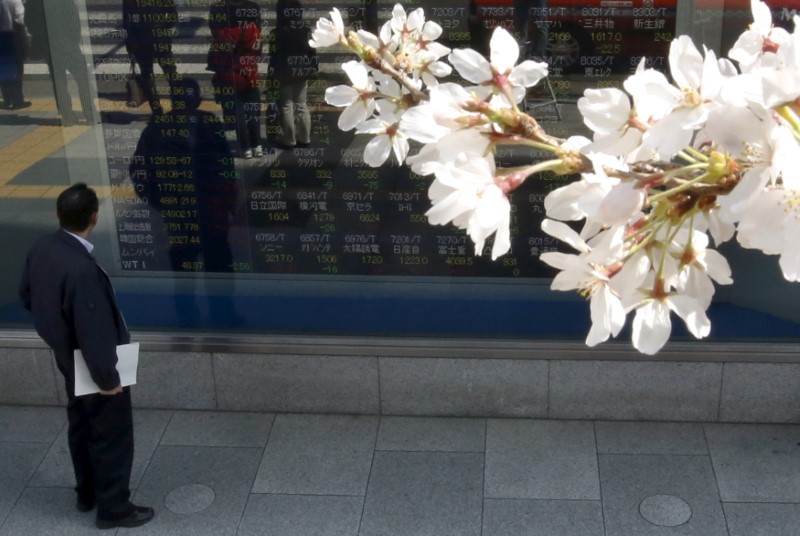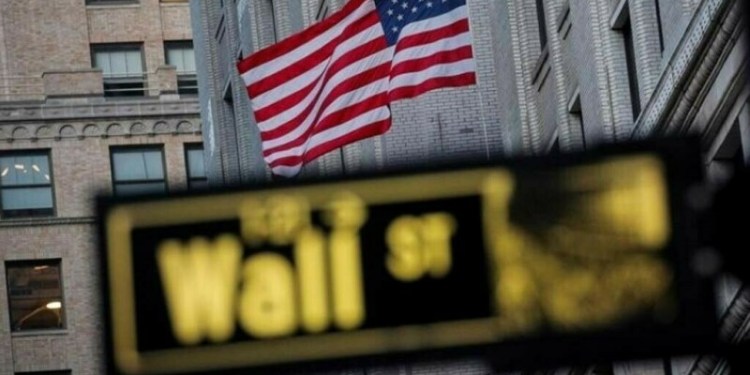 © Reuters. A Tokyo businessman look at an electronic stock quotation board, as cherry blossoms bloom, outside a brokerage in Tokyo
© Reuters. A Tokyo businessman look at an electronic stock quotation board, as cherry blossoms bloom, outside a brokerage in TokyoBy Tetsushi Kajimoto
TOKYO (Reuters) – The public approval ratings of Japan’s prime minister may have plunged to record lows following a scandal over suspected cronyism, but a Reuters poll shows that the Japanese business community has a much more positive view of him.
Out of 223 respondents, 73 percent wanted Shinzo Abe to win a third, three-year term as the leader of the ruling Liberal Democratic Party (LDP), which would pave the way for him to continue as prime minister and become Japan’s longest-serving premier. The LDP is to hold a vote to elect a party leader in September.
The survey responses point to a desire for political stability and a lack of confidence in political alternatives, particularly among opposition parties. They want the prime minister’s “Abenomics” policies that have weakened the yen and buoyed the stock market, to continue.
“A strong country needs strong government. I don’t mean that Abe has no problems, but the competence of other politicians, particularly the opposition, is extremely low,” a manager of a rubber company wrote in response to the survey. “I don’t want them to run the country.”
The general public has a much lower opinion of Abe, who has repeatedly denied suggestions that he secured favorable treatment for two friends – helping one to obtain a discount on state-owned land for a school with links to his wife, and helping the other to set up a veterinary school.
Despite the denials, Abe’s public support rating has fallen below 30 percent, the lowest since he took office in late 2012.
A persistently low approval rating could increase pressure on him to resign.
Some respondents in the Reuters survey said they would like to see another LDP lawmaker in charge of the party, although fully 94 percent want the ruling bloc that is dominated by the LDP to stay in power.
Asked who is best suited to be prime minister, Abe topped the list at 52 percent. He was followed by former cabinet minister Shigeru Ishiba – who wants to challenge Abe for the top post – with 17 percent.
Popular young LDP lawmaker Shinjiro Koizumi, the son of ex-Prime Minister Junichiro Koizumi, garnered 13 percent.
Japan’s latest GDP data showed the economy is in the midst of its longest run of growth in almost three decades, which a wholesaler, who responded to the survey, credited to Abe’s policies.
“I strongly hope he will stay in power for a long period of time,” the wholesaler said.
“ABEXIT”
Less flattering views included a manager at a transport equipment maker who said Abe had grown arrogant after being in power for so long and a retailer who said Abe’s “hands may be tied with a series of scandals.”
Investors do not expect change either. They see the risk of a so-called Abexit as small.
Markets reacted with relief after a meeting between Abe and U.S. President Donald Trump last week avoided any mention of foreign exchange rates or criticism of Japan’s monetary policy. The two leaders agreed to facilitate bilateral trade talks.
Since entering office, Trump has taken a hard line on trade, imposing higher taxes on some imports and looking to renegotiate trade agreements.
The survey showed that businesses were evenly split on whether Japan should adopt a bilateral free trade agreement (FTA) with the United States in order to avoid import restrictions, the biggest concern for Japanese firms if a bilateral FTA is negotiated.
But most saw the TPP multilateral trade push, from which the United States has withdrawn, as the most effective deal for the Japanese economy.
The monthly poll, conducted April 4-17 by Research on behalf of Reuters, polled 542 big and medium-sized firms with managers responding on condition of anonymity.
Source: Investing.com




























